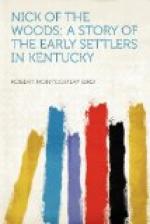“Whar?” cried the senior, eagerly,—“not in our limits?”
“No, by Jehoshaphat,” replied Tom; “but nigh enough to be neighbourly,—on the north bank of Kentuck, whar he has left his mark right in the middle of the road, as fresh as though it war but the work of the morning!”
“And a clear mark, Tom?—no mistake in it?”
“Right to an iota!” said the young man;—“a reggelar cross on the breast, and a good tomahawk dig right through the skull; and a long-legg’d fellow, too, that looked as though he might have fou’t old Sattan himself?”
“It’s the Jibbenainosay, sure enough; and so good luck to him!” cried the commander: “thar’s a harricane coming!”
“Who is the Jibbenainosay?” demanded Forrester.
“Who?” cried Tom Bruce: “Why, Nick,—Nick of the Woods.”
“And who, if you please, is Nick of the Woods?”
“Thar,” replied the junior, with another grin, “thar, strannger, you’re too hard for me. Some think one thing, and some another; but thar’s many reckon he’s the devil.”
“And his mark, that you were talking of in such mysterious terms,—what is that?”
“Why, a dead Injun, to be sure, with Nick’s mark on him,—a knife-cut, or a brace of ’em, over the ribs in the shape of a cross. That’s the way the Jibbenainosay marks all the meat of his killing. It has been a whole year now since we h’ard of him.”
“Captain,” said the elder Bruce, “you don’t seem to understand the afta’r altogether; but if you were to ask Tom about the Jibbenainosay till doomsday, he could tell you no more than he has told already. You must know, thar’s a creatur’ of some sort or other that ranges the woods round about our station h’yar, keeping a sort of guard over us like, and killing all the brute Injuns that ar’ onlucky enough to come in his way, besides scalping them and marking them with his mark. The Injuns call him Jibbenainosay, or a word of that natur’, which them that know more about the Injun gabble than I do, say, means the Spirit-that-walks; and if we can believe any such lying devils as Injuns (which I am loath to do, for the truth ar’nt in ’em), he is neither man nor beast, but a great ghost or devil that knife cannot harm nor bullet touch; and they have always had an idea that our fort h’yar in partickelar, and the country round about, war under his friendly protection—many thanks to him, whether he be a devil or not; for that whar the reason the savages so soon left off a worrying of us.”
“Is it possible,” said Roland, “that any one can believe such an absurd story?”
“Why not?” said Bruce, stoutly. “Thar’s the Injuns themselves, Shawnees, Hurons, Delawares, and all,—but partickelarly the Shawnees, for he beats all creation a-killing of Shawnees,—that believe in him, and hold him in such eternal dread, that thar’s scarce a brute of ’em has come within ten miles of the station h’yar this three y’ar; because as how, he haunts about our woods




